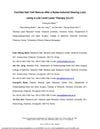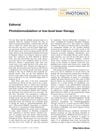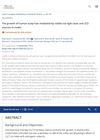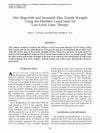
Low Level Laser Therapy may improve noise-induced hearing loss.
[object Object] July 2022 in “Journal of Investigative Dermatology” Combining Low Level Light Therapy and minoxidil may help with hair growth, but more research is needed.
Both treatments improved hair loss, but 15% Minoxidil caused more side effects than Low Level Laser Therapy.
May 2019 in “Case medical research”  45 citations,
December 2018 in “Lasers in Medical Science”
45 citations,
December 2018 in “Lasers in Medical Science” LLLT promotes hair growth and improves hair density safely in men and women.
 33 citations,
January 2021 in “Aesthetic Surgery Journal”
33 citations,
January 2021 in “Aesthetic Surgery Journal” Low-Level Light Therapy (LLLT) is a safe and effective method for skin rejuvenation, acne treatment, wound healing, body contouring, and hair growth, but more well-designed trials are needed for confirmation.
 8 citations,
October 2020 in “Lasers in Medical Science”
8 citations,
October 2020 in “Lasers in Medical Science” LLLT helps treat hair loss by increasing blood flow, reducing inflammation, and stimulating growth factors.
 7 citations,
March 2020 in “Lasers in Medical Science”
7 citations,
March 2020 in “Lasers in Medical Science” LLLT is a safe, promising hair loss treatment, but more research needed.
 6 citations,
September 2018 in “Journal of Dermatological Treatment”
6 citations,
September 2018 in “Journal of Dermatological Treatment” LLLT devices for hair loss need more research to define proper guidelines.
 May 2024 in “International Society of Hair Restoration Surgery”
May 2024 in “International Society of Hair Restoration Surgery” New treatments like PRP, PRF, SVF, exosomes, and LLLT show promise for hair growth.
 December 2020 in “Actas Dermo-Sifiliográficas”
December 2020 in “Actas Dermo-Sifiliográficas” LLLT increases hair density and growth in AGA patients.
 January 2019 in “Springer eBooks”
January 2019 in “Springer eBooks” PRP and LLLT can improve hair growth in AGA, but more research needed.
 1057 citations,
November 2011 in “Annals of Biomedical Engineering”
1057 citations,
November 2011 in “Annals of Biomedical Engineering” Low-level Laser Therapy may help reduce inflammation, pain, and aid healing, but more research is needed to confirm its effectiveness and establish standard treatment guidelines.
433 citations,
April 2015 in “Photomedicine and laser surgery” Photobiomodulation Therapy (PBMT) is recommended as a more inclusive term and shows potential benefits in various treatments.
 160 citations,
December 2016 in “Journal of biophotonics”
160 citations,
December 2016 in “Journal of biophotonics” Low-level laser therapy, now called photobiomodulation, is recognized for its broad medical applications and scientific backing.
 117 citations,
September 2013 in “Lasers in Surgery and Medicine”
117 citations,
September 2013 in “Lasers in Surgery and Medicine” Red light therapy at 655 nm significantly improved hair growth in men with hair loss.
 106 citations,
April 2013 in “Dermatologic Surgery”
106 citations,
April 2013 in “Dermatologic Surgery” Low-level light therapy safely improves hair growth and thickness for androgenetic alopecia.
 90 citations,
January 2009 in “Journal of cosmetic and laser therapy”
90 citations,
January 2009 in “Journal of cosmetic and laser therapy” Low-level laser therapy might help hair growth, but more research is needed.
 81 citations,
August 2014 in “Lasers in Surgery and Medicine”
81 citations,
August 2014 in “Lasers in Surgery and Medicine” Red light therapy is safe and effectively increases hair growth in women with hair loss.
 75 citations,
August 2003 in “International journal of cosmetic surgery and aesthetic dermatology”
75 citations,
August 2003 in “International journal of cosmetic surgery and aesthetic dermatology” The HairMax LaserComb made hair grow more and get stronger for people with hair loss.
 65 citations,
March 2016 in “Lasers in Medical Science”
65 citations,
March 2016 in “Lasers in Medical Science” Most low-level light therapy studies did not accurately report how light was measured, affecting treatment reliability.
 60 citations,
December 2015 in “Lasers in Medical Science”
60 citations,
December 2015 in “Lasers in Medical Science” Low-level laser therapy is safe and can increase hair growth for male and female pattern hair loss.
 54 citations,
May 2018 in “Journal of The European Academy of Dermatology and Venereology”
54 citations,
May 2018 in “Journal of The European Academy of Dermatology and Venereology” Low level laser therapy works best for hair loss, followed by PRP, finasteride, and minoxidil.
[object Object]  47 citations,
April 2016 in “Lasers in Surgery and Medicine”
47 citations,
April 2016 in “Lasers in Surgery and Medicine” Low-level laser therapy may improve hair regrowth and thickness for androgenetic alopecia, but more research is needed.
 46 citations,
September 2010 in “Southern Medical Journal”
46 citations,
September 2010 in “Southern Medical Journal” Hair loss treatments include medications and new methods like low-level light therapy, which may work by boosting cell activity and blood flow.
 45 citations,
January 2014 in “International Journal of Trichology”
45 citations,
January 2014 in “International Journal of Trichology” Low-level laser therapy helps male and female hair loss alone or with other treatments.
 42 citations,
August 2013 in “International Journal of Women's Health”
42 citations,
August 2013 in “International Journal of Women's Health” Female pattern hair loss is caused by multiple factors and while treatments like topical minoxidil, hormone therapy, and low-level light therapy can help, none can fully cure it.
 34 citations,
May 2017 in “Lasers in Surgery and Medicine”
34 citations,
May 2017 in “Lasers in Surgery and Medicine” Combining low-level light therapy and minoxidil 5% is more effective for female hair loss than using either treatment alone.
 31 citations,
June 2018 in “Dermatologic Surgery”
31 citations,
June 2018 in “Dermatologic Surgery” Low-level light therapy safely improves hair coverage, thickness, and count in androgenetic alopecia patients.

























